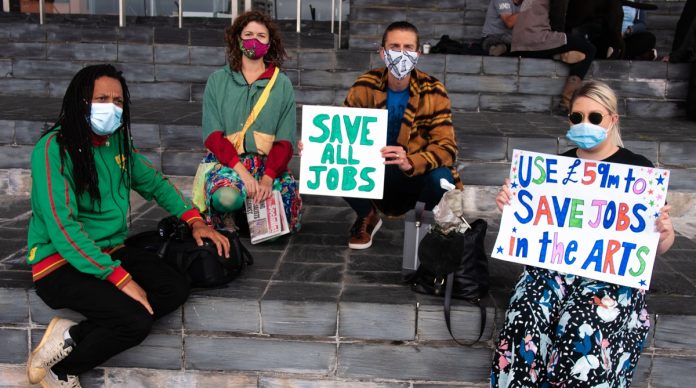Sam Hey, Manchester Socialist Party
Arts Council England (ACE) is being ‘reviewed’ by the Tory government, after coming under scrutiny due to a change of guidance earlier in the year. In January, ACE released guidance warning artists ‘political statements’ that may lead to ‘reputational risk’ towards an arts organisation could be grounds for a loss of funding. This blatant attempt at silencing the voices of political artists was met with outcry from a range of artists and Equity, the performing arts and entertainment union, resulting in the guidance being revoked. (See ‘Arts Council England attacks ‘political’ artists funding’).
Chronic underfunding
The Tories’ chronic underfunding of the arts has bred a competitive culture when it comes to funding applications. Smaller arts organisations compete with funding bids, while large organisations can be included in the ‘National Portfolio’, with guaranteed funding for three years straight from ACE. Currently, ACE is responsible for allocating £445 million of spending.
A centralised public body, supposedly ‘independent’ from the government, is poorly placed to deliver art projects tailored to local communities. A move to a more devolved funding system, with decisions made democratically at the local level by councils, would lead to projects focused on localised and long-lasting impact. This model would encourage publicly funded projects to be tailored to specific communities’ needs.
Arts funding can be used in a variety of ways that transcend entertainment. In 2021, the Greater Manchester Combined Authority funded a political art project that used ‘legislative theatre’ to inform the new Greater Manchester Homelessness Prevention Strategy. This project provided work to a group of artists and a large group of people who had experienced homelessness, or were currently homeless, and empowered them to make a legislative impact on local council policy moving forward. This use of arts funding to promote participatory democracy was effective because the people it impacted could see the change they were making in real time, in the area they live in. The review of the project highlighted how underfunded the project was. It stated: ‘The cost is fairly minimal for the amount of engagement, knowledge produced, and relationships fostered.’ We need to campaign for the resources needed to turn this participation into material improvements for people hit by the housing crisis.
Equity has launched a campaign called ‘Stop the Cuts’, demanding local election candidates oppose cuts to existing funding and pledge to ring-fence culture funding in the May elections. It also demands a requirement for union contracts, terms and conditions for all public funding of the arts. I would go one step further, and demand candidates lobby government to increase cultural funding and begin reversing the 40% reduction in funding per person since 2010. This has to be linked to refusing to implement all cuts, using councils’ reserves and borrowing powers and launching working-class campaigns to demand the funding needed from central government.
With local elections on the horizon, I encourage you to ask candidates if they will commit to enriching and strengthening the communities they stand in and support arts funding. Will you vote for someone who will be complicit in the closure of arts venues, companies, and communities across the country, as our cultural heritage is undermined by turning to corporate backers to survive?
In the upcoming local elections, every Trade Unionist and Socialist Coalition candidate will, if elected, stand against the cuts and support local art near to you.
Sam is standing for TUSC in Harpurhey ward







